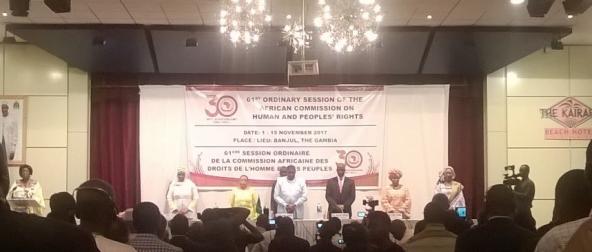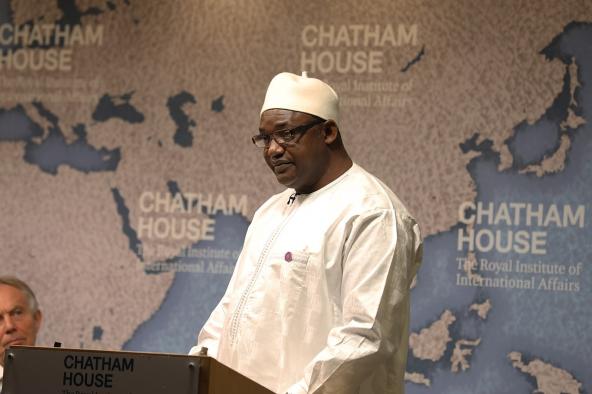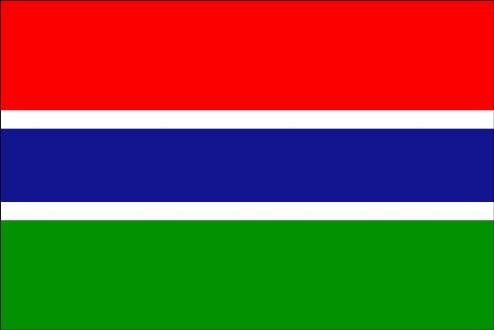
« A new Gambia » welcomes the 61st session of the ACHPR
Before the opening of the 61st session of the ACHPR, the NGO Forum took place from October 28 to October 30, 2017. The Secretary of Justice, Abubacarr Tambadou, delivered the opening speech in which he highlighted the signature on September 20, 2017 of the Second Optional Protocol to the Internal Covenant on Civil and Political Rights. He also announced the ratification of several human rights treaties.
On this note of hope and to reinforce the dialogue on human rights between the African Union and the European Union, the NGO Forum welcomed Stavros Lambrinidis, the EU special Representative for Human Rights. Mr Lambrinidis recalled the inalienability and indivisibility of human rights, in Europe, in Africa, and all around the world.
The Forum underlined how unfair the death penalty is.
Following up with the World Day Against the Death Penalty, a side event, organized by the World Coalition, FIACAT and FIDH, discussed the theme of the death penalty and poverty.
Pamela Okoroigwe, LEDAP (Nigeria), Salomon Nodjitoloum (ACAT Chad) and Jean Jacques Ngangya, Pax Christi Uvira (DRC) participated in the panel. The speakers discussed the death penalty in their respective country and underlined the impact of poverty on the death penalty. LEDAP’s representative emphasized how corruption is prevalent in Nigeria. Because they do not have the necessary resources to bribe police officers, judges and prosecutors, people from poor economic background are more likely to be sentenced to death.
In Chad, Salomon Nodjitoloum regretted the government’s decision to reestablish the death penalty for terrorist offenses. He also made the link between poverty and the rise of terrorism in Chad: “For us, poverty is terrorism’s principal ally even though it is not the only factor. Most of terrorism’s recruits are school dropout or unemployed people… Terrorists are often people living in margin of society. To weaken terrorism, we need to fight social misery.”
Finally, Pax Christi Uvira’s Director shared his concerns regarding people sentenced to death in the country. “They are poor citizens who are victims of their legal ignorance. Tribunals are far away, defense is ineffective, fees are high. They’re victim of their lack of social and economic resources and cannot face the complexity of the judicial system.”
The 61st session of the ACHPR brings to the fore the abolition of the death penalty in Africa
Sunday, 5 November, FIDH and DITSHWANELO organized a side event with the ACHPR’s Working Group on the Death Penalty and Extra-Judicial, Summary or Arbitrary Killings in Africa to discuss the different mechanisms enabling the abolition of the death penalty in the continent. On this occasion, DITSHWANELO released a study on these mechanisms in Southern Africa. FIDH also screened “Gambia has decided”, a movie on the abolition process in Gambia.
During this panel, the representative of the Gambian Ministry of Justice recalled its willingness to abolish the death penalty. The government also wishes to amend the Gambian Constitution to include the abolition of the death penalty.
According to Ms. Kayitesi, Commissioner and President of the Working group on the death penalty of the ACHPR, political leaders have the last word when it comes to abolish the death penalty. A unequivocal abolitionist, as the one expressed by Gambian authorities, is necessary for a complete abolition of the death penalty in Africa.
Mr. Mabassa Fall, FIDH representative before the African Union, recalled civil society’s role: educate and raise awareness in order to assist governments on the path to abolition. Indeed, public opinion in Africa is not well aware of wrongful convictions and the definitive and discriminatory aspects of the death penalty. He also underlined the fact that people living in poverty are the ones sentenced to death.
Review of the periodic State reports
During the 61st Ordinary session, the African Commission reviewed reports from Rwanda, Niger and the Democratic Republic of Congo.
While reviewing Rwanda’s report, Commissioner Maya Sahli-Fadel, member of the Working Group on the Death Penalty, expressed her wishes to obtain feedback of the abolition process in order to share it with other African retentionist countries. According to the Rwandan delegation, the death penalty did not contribute in a decline of criminality rates. On the contrary, the death penalty demonstrated its inefficiency. 2000 people were on Rwandan death row when the country abolished the death penalty in 2007. Today, the former prisoners have reintegrated society and obtained a second chance.
While reviewing Niger’s report, Commissioner Kayitesi reiterated her concerns expressed by the World Coalition, FIACAT and its members in Niger in a position paper on the death penalty in the country. She congratulated the Justice Secretary for his commitment on death penalty issues and questioned him on the abolition process. She invited Niger to support the Draft Protocol to the African Charter on Human and Peoples’ Rights on the Abolition of the Death Penalty in Africa when it will be discussed at the African Union. The Niger delegation informed the ACHPR of its bill aiming at the ratification of the OP2, even though the bill has not been discussed in the National Assembly since it was introduced for the first time in 2014. For democracy’s sake, the government does not wish to force the legislative process. The Secretary of Justice stated that he did not believe in the death penalty and “never will”. He recalled the Niger commitment to abolish capital punishments and stated that Niger “will support the Draft Protocol aiming at the abolition of the death penalty in Africa and any reforms aiming at enforcing human rights in Africa.” Niger also committed to commute on National Day (April 18, 2018) 11 death sentences into imprisonment sentences.
During the DRC’s review, Commissioner Kayitesi asked why the country did not use the implementation of the Rome Statute (which created the International Criminal Court) to abolish the death penalty in the country. The government delegation answered that a de facto moratorium has been put in place. The Parliament is currently debating on this issue. Out of respect for the separation of powers, the government does not wish to interfere.
During an oral joint statement, the World Coalition, FIACAT and FIDH recalled the importance of having a legally binding document aiming at the abolition of the death penalty in Africa. They also reaffirmed their support to the Commission’s call to abolitionist countries to support the Draft Protocol when the former will be discussed at the African Union.
Categories
Gambia





